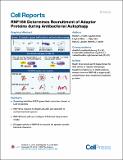RNF166 Determines Recruitment of Adaptor Proteins during Antibacterial Autophagy
Author(s)
Heath, Robert J.; Goel, Gautam; Baxt, Leigh A.; Rush, Jason S.; Mohanan, Vishnu; Paulus, Geraldine L.C.; Jani, Vijay; Lassen, Kara G.; Xavier, Ramnik Joseph; ... Show more Show less
DownloadRNF166.pdf (2.038Mb)
PUBLISHER_CC
Publisher with Creative Commons License
Creative Commons Attribution
Terms of use
Metadata
Show full item recordAbstract
Xenophagy is a form of selective autophagy that involves the targeting and elimination of intracellular pathogens through several recognition, recruitment, and ubiquitination events. E3 ubiquitin ligases control substrate selectivity in the ubiquitination cascade; however, systematic approaches to map the role of E3 ligases in antibacterial autophagy have been lacking. We screened more than 600 putative human E3 ligases, identifying E3 ligases that are required for adaptor protein recruitment and LC3-bacteria colocalization, critical steps in antibacterial autophagy. An unbiased informatics approach pinpointed RNF166 as a key gene that interacts with the autophagy network and controls the recruitment of ubiquitin as well as the autophagy adaptors p62 and NDP52 to bacteria. Mechanistic studies demonstrated that RNF166 catalyzes K29- and K33-linked polyubiquitination of p62 at residues K91 and K189. Thus, our study expands the catalog of E3 ligases that mediate antibacterial autophagy and identifies a critical role for RNF166 in this process.
Date issued
2016-11Department
Institute for Medical Engineering and ScienceJournal
Cell Reports
Publisher
Elsevier
Citation
Heath, Robert J. et al. “RNF166 Determines Recruitment of Adaptor Proteins during Antibacterial Autophagy.” Cell Reports 17.9 (2016): 2183–2194.
Version: Final published version
ISSN
2211-1247